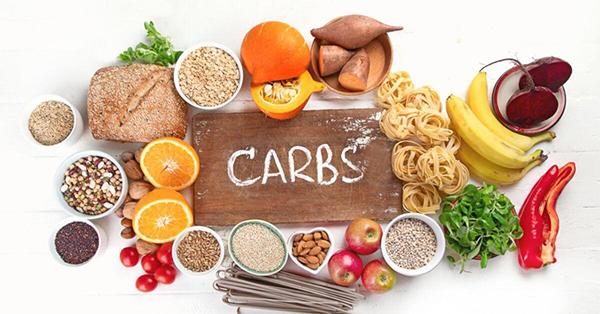Not only regular exercise people are interested in carbohydrates or sugars, but even ordinary people should learn to adjust their diet appropriately to keep the body in balance.
Many diets increase carbs or lose weight to help you gain or lose weight or keep your body normal; there are many successful people and not many!
Here, people do not understand what carbs are, what are good carbs or bad carbs, and what supplements should be added to achieve their goals while ensuring a healthy body.

What are carbohydrates?
Carbohydrates (also called carbs) are sugars, starches, and fiber. Carbohydrates are made up of CO2 in the air, water, and solar energy.
Carbs provide energy for the body. Most carbs are broken down or converted into glucose that the body can use as energy.
Carbs can also be converted into fat (stored energy) for later use if you overcharge. Now BellyFatZone invites you to refer to this article together!
What are carbohydrates and their importance?
Carbohydrates are one of the most important nutrients in your daily diet.
An in-depth look at this substance will help you supplement it properly, as well as take a look at other hot starchy diets available today.
What are carbohydrates?

Carbohydrates are a macronutrient, meaning one of the main sources of energy for the body.
There are 3 macronutrients: carbohydrate, protein, and fat. The body needs to meet a relatively large amount of these substances through eating because they cannot be produced from within.
Carbohydrates include 3 main types:
- Sugar: This is a short chain of carbohydrates found in foods. Examples are glucose, fructose, galactose, and sucrose.
- Starch: This is a long chain of glucose molecules. After being loaded into the body, starch food will be converted into glucose in the digestive system. When the body is already full of glucose, the excess is converted to glycogen stored in the muscle.
- Fiber: Fiber is an exception. It does not provide direct energy, but it feeds probiotics in the digestive system. These bacteria use fiber to produce fatty acids that somebody cells use to produce energy.
Read more: Insulin? Eating Frequently and Insulin – Mechanism of Action of Insulin
What is the role of carbohydrates in the body?
We understand what carb is, basically. The next part will be its role in the body.
It can be said that this is an essential and indispensable nutrient for the existence and development of the body. Why?
- Carb involved in body structure: cell membrane structure, cell nucleus, is a basic component of cartilage tissue, skin, artery wall …
- Participate in the body's functional activities: Immunity, reproduction, nutrition, and metabolism; The process of operation of the nervous system, erythropoiesis.
- Power supply: This is the most important role for bodybuilders. When carbs are digested in the stomach, they will be converted into glucose, fructose, and galactose. In particular, glucose accounts for 80%.
Simple and complex carbohydrates
Carbohydrates are classified into simple carbs and complex carbs. The differences between the two are in their chemical structure, absorption, and digestion rates.
1. Simple carb
- Simple carbohydrates contain only one or two sugars.
- Carbs contain 1 common sugar, fructose (found in fruits), and galactose (found in dairy products). These simple sugars are called monosaccharides.
- Carbs contain two sugars, such as sucrose (granulated sugar), lactose (milk sugar), and maltose (found in beer and some vegetables) called disaccharides.
- Simple carbs are also found in candy, soda, and syrup. However, these foods are usually made with refined sugar, without vitamins, minerals, or fiber. These are called “empty calories” and can lead to weight gain.
2. Carb complex
What are complex carbs or complex carbs? They are carbs with three or more sugars, also known as polysaccharides.
They are found in foods like peas, lentils, peanuts, and some other beans, corn, potatoes, cereals, whole grain bread.
3. Compare 2 types of carbs
While both carbs provide a lot of energy and fast, simple carbs still cause a burst of energy much faster than complex carbs because they are digested and absorbed faster.
Simple carbs can lead to a spike in blood sugar, while complex carbs provide more sustained energy.
Therefore, experts recommend consuming mostly complex carbs in your diet, including whole grains and vegetables.
Good carbs and bad carbs

In nutrition advice, we hear a lot about promoting good carbs and limiting bad carbs. But which carbs are good and which ones are bad is the problem.
Bad carbs are often found in foods like cakes, soft drinks, processed foods, white rice, white bread, etc.
These are simple carbs and have little nutritional value.
Good carbs are often complex carbs, slow-absorbing, and packed with other nutrients. They are found in whole grains, fruits, vegetables, beans, etc.
The table below will help you distinguish more easily, know what to eat and what not to eat.
| Good carbs | Bad carbs |
| Low or medium calories | High-calorie intake |
| Nutrient | Low in nutrients |
| There are no refined sugars and refined grains. | Refined sugars like corn syrup, white sugar, honey and fruit juice, lots of refined grains |
| The high amount of natural fiber | Less fiber |
| Less sodium | High sodium |
| Low in saturated fat | Maybe more saturated fat |
| Very little or no cholesterol and trans fat | It may be high in cholesterol and trans fat. |
Glycemic index (GI)
Some nutritionists have recently said that it is not the type of carbohydrate but the glycemic index that matters.
The glycemic index (GI) is a measure of the speed and amount of carbohydrates that raise blood sugar.
High GI foods like cakes will raise blood sugar quickly and quickly. Foods with low GI increase blood sugar slowly and lower levels.
Some studies suggest that foods with a high glycemic index are linked to diabetes, obesity, heart disease, and even cancers.
Therefore, learn and consider GI sugar before consuming any food.
Carbohydrate benefits for bodybuilders

As you have looked carefully at the definition of what carbohydrates are, we will review their use for gyms. What is the role of carbs in bodybuilding?
1. Increase energy, improve exercise performance
After a workout, the reason to eat carbs is to replenish the amount of glycogen that muscles have burned during exercise.
When pushing weights, the main source of energy for you is muscle glycogen. Glycogen is the storage state of glucose.
When the body converts glycogen into glucose (energy) to create ATP, muscles have enough energy to perform the exercises and limit the destruction of proteins in muscle tissue to produce energy.
In particular, 1-2 hours before training, you also need to add starch. That way, there is enough energy to sustain throughout the training session.
2. Help with weight gain
This is definitely something that skinny people must know. For fast weight gain, carbohydrate supplementation plays a vital role.
Now, do you understand why weight gain foods always have carbs?
Many people are afraid of fat, so they do not dare to eat starch. But actually, whether or not you gain weight depends on the total calories you consume and how much you consume during the day.
In fact, carbohydrates also contain less energy than fat per gram.
But high-sugar foods are often high in calories and unhealthy.
And if you eat too many carbs, there is also a possibility of fat accumulation. So, choose to eat “good” carbs and eat in moderation.
3. Support effective weight loss
Although the ability to gain weight from carbs is undeniable, it is not natural that weight-loss diets are “stigmatized, shunned” and don't dare to eat starch.
But what do carbohydrates do in weight loss?
Good carbohydrate foods, especially whole grains and shelled vegetables, are high in fiber.
Fiber helps you feel full, less hungry, and often brings meager calories. This is a substance that should not be ignored in weight loss diets.
4. A good source of nutrition
Unprocessed whole fruits and vegetables are valuable sources of nutrition. Many types are also considered “superfoods,” such as vegetables, sweet potatoes, berries, citrus …

Another important source of carbs are whole grains rich in fiber, healthy fats, and most essential micronutrients.
If you read about the gym's diet, you will see the appearance of these starchy foods.
5. Good for the heart
- Fiber helps lower cholesterol.
- The digestive process requires bile acids, which are partly made with cholesterol. When your digestion improves with fiber, the liver draws cholesterol from the blood to create more bile acids, thereby lowering LDL, also known as “bad” cholesterol.
- Reducing LDL has many positive effects on cardiovascular health, preventing many dangerous diseases.
6. Good for mental health
A 2009 study found that people on a high-fat, low-carb diet for 1 year were more likely to experience anxiety, depression, and anger than people on a low-fat, high-carb diet.
Scientists think that carbohydrates help produce serotonin in the brain. Besides, carbs also have the ability to improve memory.
The harm of lacking starch
Once you understand what carbohydrates are and how they work, look for the possible harms if your body lacks carbohydrates.
- The body has no energy, not enough fuel to function.
- The central nervous system is affected, which can cause dizziness, physical and mental impairment.
- May lead to glucose deficiency, hypoglycemia.
- If the body does not have enough carbohydrates to store, it will consume protein for fuel. This will be a serious problem because the body needs protein to build muscles.
- Using protein as a fuel instead of carbohydrates also stresses the kidneys.
- People who don't consume enough carbohydrates may also be deficient in fiber, which can cause digestive problems and constipation.
How many carbs should I load each day?

According to the National Institutes of Health (NIH), the recommended daily intake (RDA) of adults' carbs is 135 grams. However, the NIH also suggests that everyone should have their own carbohydrate level.
Carb intake for most people should be between 45-65% of total calories. Each gram of carbohydrate is equivalent to about 4 calories, so a diet of 1,800 calories per day will be equivalent to about 202-292 grams of carbs.
People with diabetes should not eat more than 200 grams of carbs a day. At the same time, pregnant women need at least 175 grams.
Currently, there is a popular diet to lose weight, which is Low Carb – limiting carbs. However, it would help if you first read the article Low Carb to understand this method's nature and apply it not to affect health.
How many carbs do you need to build muscle?
So you understand what carbohydrates are. It is an important nutrient and should be regularly supplemented with delicious carbs.
Do not follow the advice to abstain from starch that is harmful to health completely.
View more:
- Many Eat Clean Meal Prep For You Today – Save Time
- What is The Definition of TDEE? How to Calculate TDEE?
- Foods to Eat to Lose Weight in Stomach Easy to find
- How to Lose Belly Fat After 40?
References
Hopefully, the information above has helped you gain some more knowledge about “how many carbs do bodybuilders eat a day” and bring some small value. Please share this article if you feel it is useful. Thanks!






